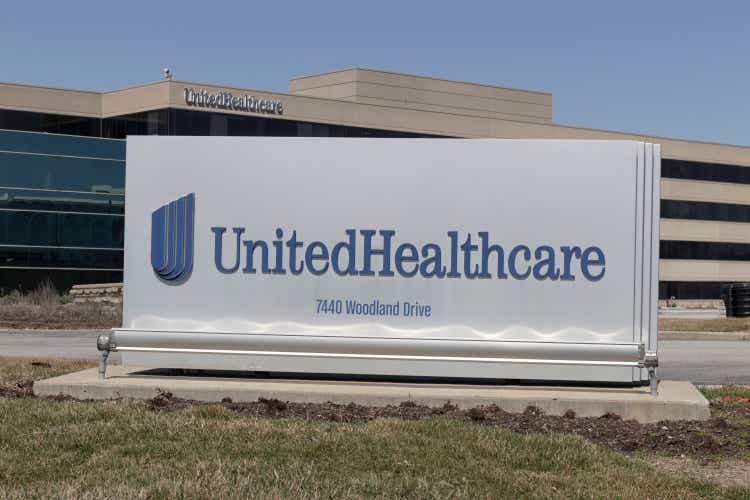Summary:
- UnitedHealthcare CEO Brian Thompson was shot outside a Manhattan hotel, with the attack appearing targeted; the assailant fled on a bike.
- Marvell Technology rallies on strong AI results, while Eli Lilly’s Zepbound outperforms Novo Nordisk’s Wegovy in weight-loss trials.
- Foot Locker tumbles due to disappointing Q3 sales and a lowered outlook.
jetcityimage
Listen below or on the go on Apple Podcasts and Spotify
UnitedHealthcare CEO Brian Thompson gunned down in Manhattan in ‘targeted’ attack. (0:15) Marvell stock soars on results. (3:19) Battle of the weight-loss drugs. (3:41)
This is an abridged transcript of the podcast.
Our top story so far. UnitedHealthcare CEO Brian Thompson was shot and killed this morning outside a midtown Manhattan hotel where he was scheduled to speak at the company’s annual investor conference.
Thompson—who was the CEO of UnitedHealth Group’s (NYSE:UNH) health benefits unit—was reportedly shot in the chest by a masked man just outside the Hilton Hotel around 6:46 a.m. local time. That’s according to the New York Post.
The assailant then fled through the nearby Ziegfield alley and used a bike to escape. The newspaper, citing police sources, said the attack appeared targeted.
The gunman is described as a white male wearing a cream-colored jacket, a black face mask, and black-and-white sneakers, carrying a gray backpack.
Looking to the economy, traders got another data point on the labor market ahead of Friday’s big jobs report.
ADP said private payrolls rose by 146,000 in November, short of the 165,000 expected. October’s rise was revised down sharply to 184,000 from 233,000.
ADP has a poor track record of indicating what the official numbers will be, though.
In addition, the November ISM Services index slipped to 52.1 from 56 in October, missing the 55.5 consensus estimate. While the index fell, the reading of over 50 marked the fifth straight month of expansion in the services sector and the 51st time in 54 months that the index signaled growth.
Wells Fargo economists say services sector prices are clouding the outlook for the Fed.
“The challenge confronting policymakers is how to slow growth in the service sector without completely extinguishing it and without keeping policy too restrictive for manufacturing and other rate-sensitive parts of the economy,” they said.
“Election results are showing signs of influencing service-related sentiment with implications for prices. A respondent from the information sector noted ‘concern after the presidential election that tariffs will affect prices for electronics and components in 2025.’ A different respondent drew a comparison to another period of supply disruption, saying, ‘Election results and the potential tariff changes would impact inventory and lead to higher prices in the hospital supply chain.’ What we saw during COVID-19 with startup U.S. production is a warning sign again.”
In geopolitics, attention is still on the fast-moving events in South Korea. President Yoon is now facing impeachment after his shock declaration of martial law, which was overridden by parliament in short order.
UBS Chief Economist Paul Donovan says the big picture for investors is simply that martial law is not supposed to happen in advanced economies.
“In any country, at a time of dramatic structural economic change, intellectual freedom and the ability to challenge the status quo are vital to innovation and the rule of law is critical to investor confidence,” he said.
The events are a reminder of the impermanence of systems taken for granted. On this day in 1892, General Francisco Franco was born. Under his rule from 1939, Spain was a dictatorship until 1975, with the first general election not coming until 1977.
And this just in from Chevy Chase at the anchor desk: “Generalissimo Francisco Franco is still dead.”
Moving to active stocks today, Marvell Technology (MRVL) is rallying sharply post-earnings, and analysts are pointing to its results as another reason why the AI gravy train isn’t slowing any time soon.
Needham analyst N. Quinn Bolton said: “Next year, both custom AI silicon and electro-optics are expected to grow meaningfully, leading to significant upside to our prior estimates.”
Eli Lilly (LLY) said its weight-loss drug Zepbound provided a 47% greater relative weight loss compared to rival Novo Nordisk’s (NVO) Wegovy in the first head-to-head trial of the two blockbuster weight loss drugs.
In a study sponsored by Lilly, people taking Zepbound lost an average of 20% of their body weight, while those on Wegovy shed 14%.
Novo Nordisk responded: “In combination with diet and exercise, Wegovy is the only obesity medicine proven to reduce the risk of major cardiovascular events such as death, heart attack, or stroke in adults with known heart disease and with either obesity or overweight.”
And Foot Locker (FL) is tumbling as a drop-off in sales after Back-to-School shopping and an elevated promotional environment resulted in a disappointing third quarter and lowered outlook.
For the current quarter, adjusted EPS is expected to come in between $0.70 and $0.80, well below the consensus of $0.95.
In news from the Magnificent 7 mutual appreciation society
Apple (AAPL) says it is using the custom artificial intelligence chips from Amazon’s (AMZN) cloud computing unit and is evaluating its latest AI chip for pre-training models.
Benoit Dupin, Apple’s senior director of machine learning and AI, said at the annual AWS Reinvent conference: “We have a strong relationship, and the infrastructure is both reliable and able to serve our customers worldwide.”
He noted that Apple has been using AWS for over a decade in its products and services, including iPads, Siri, and the App Store. The company has also used AWS’ Inferentia and Graviton chips for search services, which have led to around 40% efficiency gains in machine learning workloads.
And in the Wall Street Research Corner, investors look to position themselves to take advantage of what many hope to be the start of the Santa Claus rally that takes place in the market over the course of December.
“The Santa Claus rally is real and tends to occur over the last five sessions of December and the first two days of January,” BofA’s team says.
Going back to 1928, December is likely to trade higher 74% of the time, with an average return of 1.32%. In election years, that rose to 83% with an average return of 1.51%.
“December shows stronger SPX returns over the last ten sessions of the month vs the first ten days of the month. The first ten days of December have a lackluster SPX average return of 0.05% with this period up 59% of the time. The last ten sessions of December are much stronger with the SPX up 72% of the time on an average return of 1.17%,” they said.
Editor’s Note: This article discusses one or more securities that do not trade on a major U.S. exchange. Please be aware of the risks associated with these stocks.

